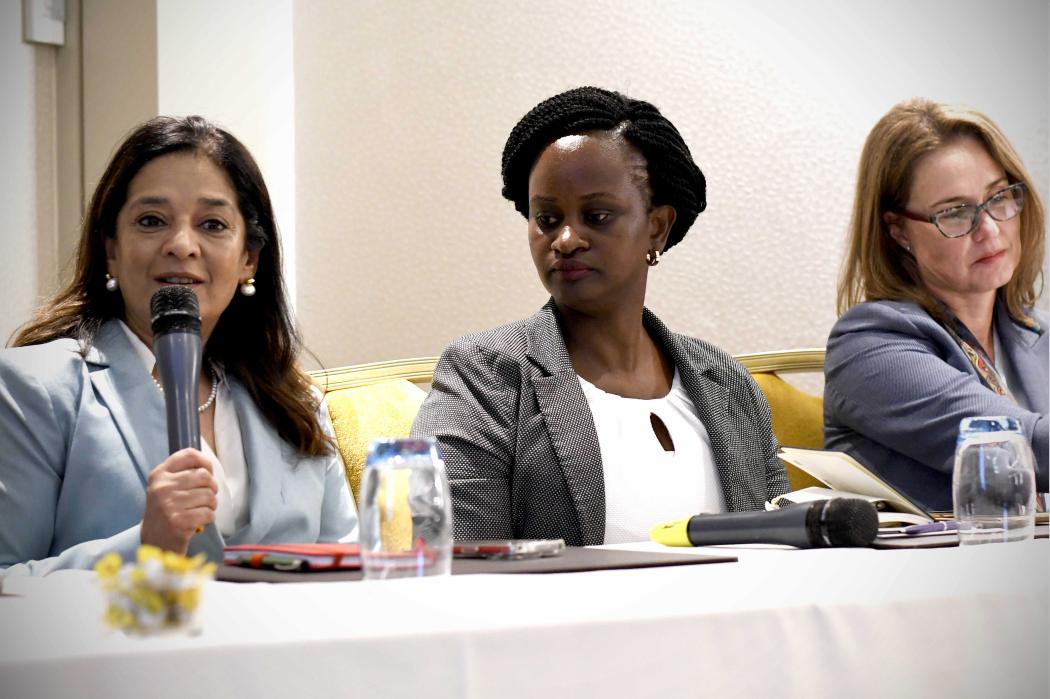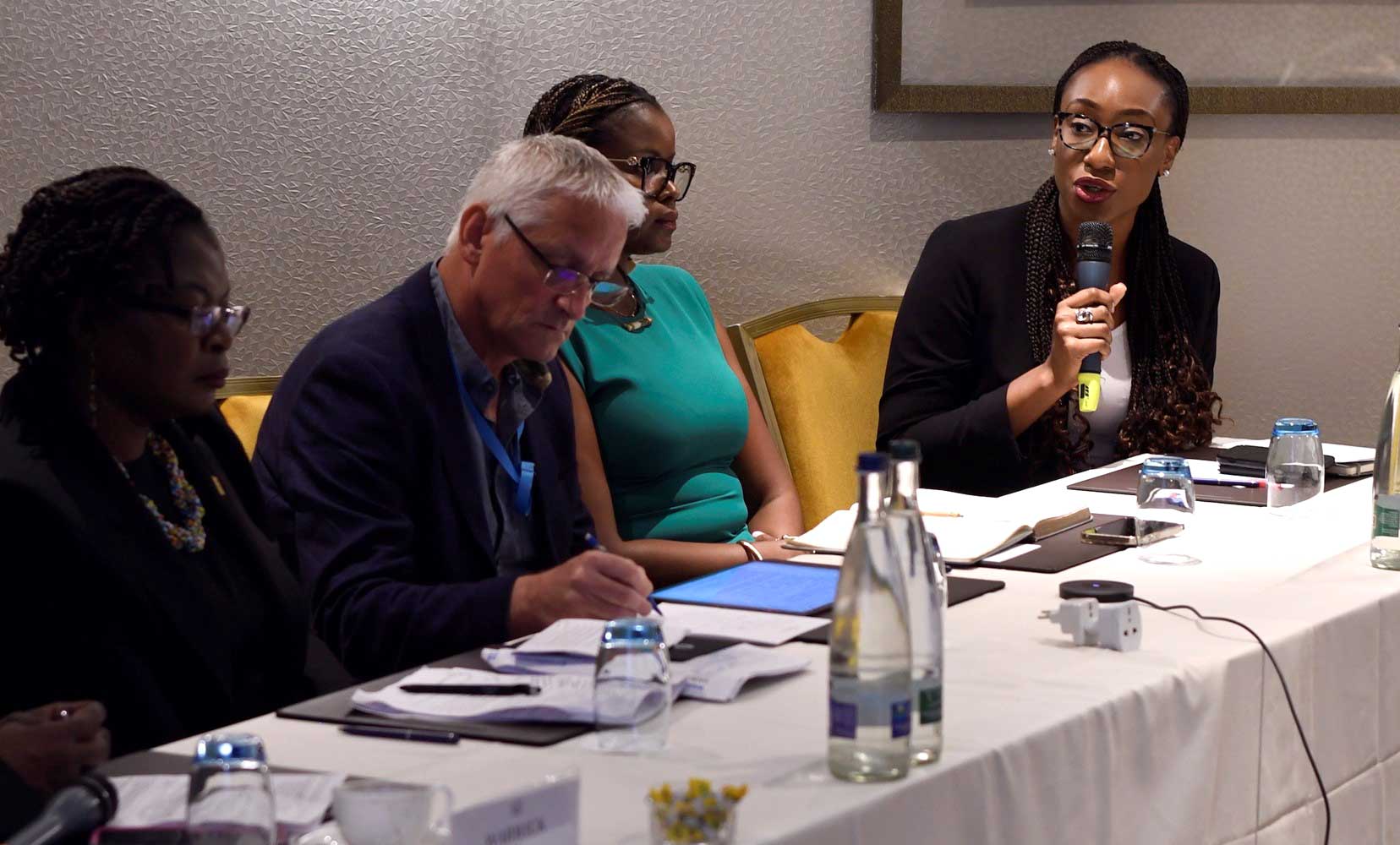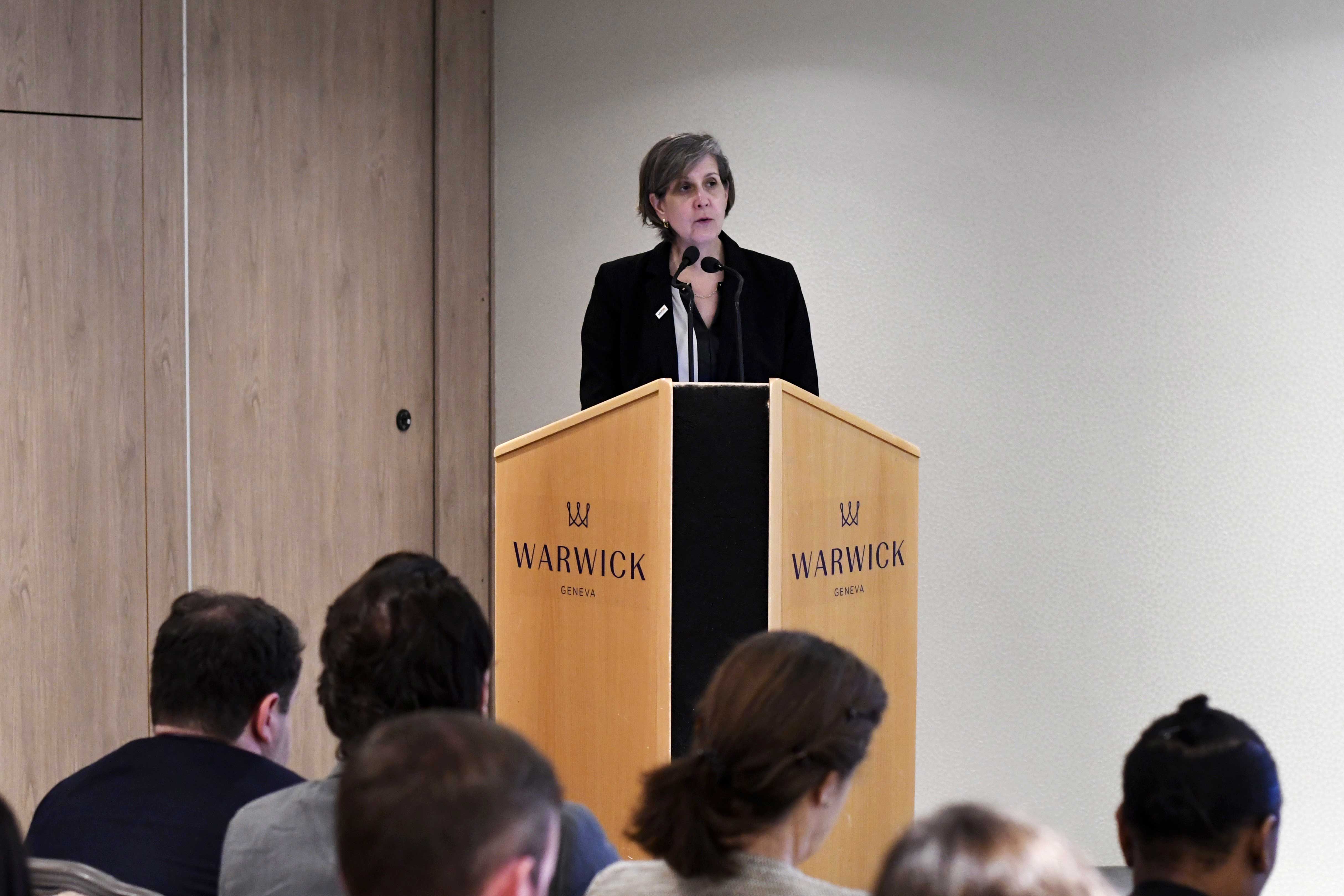Key Insights from the Coalition’s Symposium Hosted Alongside the World Health Assembly

Priya Basu, executive head of the Pandemic Fund, discusses how the Fund prioritizes health workers in its efforts to prevent and respond to pandemics. Photo by Flavio Lucchesi.
Headed by the Frontline Health Workers Coalition alongside the 77th World Health Assembly in Geneva, Innovate, Empower, Protect: A Symposium for Shaping the Future of the Health Workforce convened policy makers, government delegates, technical experts, and advocates to engage in critical conversation around key strategies for creating a more enabling environment for all health workers.
The symposium was co-hosted by partners including IntraHealth International, CARE USA, Living Goods, Johnson & Johnson, Pathfinder International, Project Hope, Seed Global Health, and Smile Train. Coalition Chair Crystal Lander, executive vice president, Pathfinder International, and Policy Working Group Co-Chair Jed Meline, director, policy and advocacy, Project Hope, led the dialogue with policymakers, technical leaders, and key decision makers.
Lander introduced the conversation with recognition that: “Despite all the present gains, we know that the health workforce still needs us to push for resources to adequately implement the policies, programs, and the research to address the myriad of complex challenges facing the health workers.” This statement reverberated throughout the panel discussions, as esteemed experts examined lessons and strategies to strengthen the multidisciplinary health workforce and ensure that all cadres of the health workforce, from facility-based to community-level, have the resources they need to provide comprehensive health services to communities, including in fragile settings.
Amplify and empower health workers

Dr. Uche Opara, a medical doctor and chief health officer at Project HOPE, highlights the need to promote health workers as leaders in advising health workforce interventions. Photo by Flavio Lucchesi.
Developing and scaling up innovative and locally-led solutions for supporting health workers is critical, and the voices and needs of health workers need to be front and center in any global health fora, health systems strengthening efforts, and universal health coverage (UHC) strategies. Dr. Uche Opara, a medical doctor and chief health officer at Project HOPE, discussed the organization’s approach to supporting health workers through education, including using e-learning platforms for continuous professional development, global educational partnerships for twinning global academic institutes with regional and national entities, and community-based mentorship connections. These interventions are tailored to diverse community contexts and focus on the preparedness of the health workforce, promoting health workers as leaders in advising interventions. Dr. Opara re-emphasized this as a central tenet of an effective approach: “We need to look at this investment as holistically as possible and hear from the health workers. Let all our interventions be driven by what they want, what they need, and based on the data that is available.”
Vicky Reed, a registered nurse and interim executive director at Partners in Health, Sierra Leone, and Dr. Hanna B. Demeke, nurse epidemiologist at the US Centers for Disease Control and Prevention, demanded greater representation of women health workers in leadership positions that will enable them to guide collaborative agendas to strengthen the health workforce. Reed attested: “Nurses, by virtue of our profession and our role, are able to navigate throughout the health system. We’re able to look at the daily work, the nitty gritty details. We’re able to innovate, to multitask, we’re able to make do with very, very little.” This resourcefulness and intimate familiarity with the demands of health systems is invaluable in local implementation processes and should be prioritized in influential leadership positions.
In a field heavily dominated by women, health workforce support will be strengthened through ensuring gender equality and empowering female health workers, according to Chikwe Mbweeda, country director of CARE Zambia. CARE Zambia has been investing in a cadre of “community health entrepreneurs” by training female community health workers and volunteers in entrepreneurship skills, enabling them to sell basic health products to the communities in which they live and work. This not only improves access to health care in underserved areas in Zambia, but also creates sustainable profit sources for these women health workers and increases retention.
Foster collaborative partnerships

In her keynote remarks, Michelle Sumilas, assistant to the administrator at USAID, says the US government prioritizes the safety and protection of health care workers, expanding equitable employment, and equipping health workers with the resources and technologies they need. Photo by Flavio Lucchesi.
Michelle Sumilas, assistant to the administrator at USAID, presented two of the agency's current initiatives: Together We Care and the Community Health Delivery Partnership (CHDP). Together We Care works in partnership with UNI Global Union, a global trade union confederation, to advance women’s economic security through bargaining and promoting safer and violence-free work environments, while CHDP supports data-driven mobilization of investments to advance community health worker status, rights, and protections through partnerships with UNICEF, WHO, and other global partners and participants. Sumilas insists that these efforts are essential: “Without really addressing the health care worker shortage and taking practical steps to mobilize resources, we will not be able to address the SDGs, to recover from the COVID pandemic—it is time to move forward.” These approaches adapt global resources for effective, locally-led applications through collaborative partnerships. Similarly, Catherine Kane, technical officer at the WHO, promotes the Working for Health Programme, Global Health and Care Workers’ Compact, and the Pandemic Fund as initiatives that unite a variety of stakeholders to support national workforce capacity.
Long-term multisectoral funding both from donor and domestic sources is critical to ensure innovative and sustainable health workforce investments. These partnerships enable the dialogue, data production, and investment capabilities necessary to support capacity and retention in all cadres of health workers. Paul Marsden, senior health workforce specialist at the World Health Organization, presented the Africa Health Workforce Investment Charter and Forum. Providing guidelines for innovative, data-driven investment, Marsden tasks cross-sectoral collaborations to integrate government-led strategies and stakeholder interests into cohesive national investment plans prioritizing effective and sustainable health systems.
Such engagement has already proven successful in other initiatives. The Pandemic Fund, for example, utilizes investments from the international to local level to strengthen countries’ capacities for pandemic prevention, preparedness, and response, including strengthening the health workforce among its top three priorities. Priya Basu, executive head of the Pandemic Fund, stated: “The idea really is to bring all of these partners together to collaborate around needs at the country and regional level, so that there is a coherent funding stream for strengthening pandemic prevention, preparedness, and response.” The success of the Pandemic Fund demonstrates the efficacy of partnerships when willing to engage in dialogue to operationalize productive, enduring investments.
Private-sector actors are eager to engage in such partnerships. Michelle Erwee, global head of access to medicines at Takeda explained, “As a pharmaceutical company, we don’t have all the relevant expertise… it’s very important that we co-collaborate and co-partner, you need to have the local know-how brought together with global expertise.” Enthusiastic engagement in data-driven partnerships creates enduring impacts through health workforce investment.
Prioritize long-term, sustainable investments
Dr. Kenneth G. Ronquillo, undersecretary of health for the Philippines, showcases the country's plan to protect health workers’ rights and wellbeing. Photo by Flavio Lucchesi.
Long-term, sustainable investments are essential for bolstering the health workforce, and positive yields are felt across the public and private sectors. Dr. Kenneth G. Ronquillo, undersecretary of health for the Philippines, showcased the country’s Human Resources for Health Philippine Masterplan 2020-2040, in which “the objective of ensuring health workers’ rights and wellbeing are protected and advanced” is clearly indicated. In fact, Dr. Ronquillo said: “Action Item number 7 specifically states to guarantee that health workers are committed, fairly compensated, and adequately given opportunities for professional development in healthy working environments.” Ronquillo highlighted the effectiveness of long-term investments and asserted that multi-sectoral reforms and “a strong push to encourage private-sector investments” will be key to replicating and expanding upon these successes elsewhere. Ronquillo concluded with a call for actors to “continue to think of what has been not done before and implement reforms that expand our usual conceptions of how to tackle premium problems in the health workforce,” addressing the need for reimagined strategic applications of health systems funding.
Jules Souleymane Gaye, country director, Burkina Faso at Living Goods, advocated for the successes of such strategies, detailing the sustainable impact of innovative digital technology investments in Burkina Faso. Living Goods has acted as a pioneer in digital health solutions, and is now introducing electronic health information systems and primary health service tools to local communities. Gaye testified that these resources have “been transformative” and are “truly changing how community health workers can be supported to expand access to care.” According to Susannah Shaefer, president and CEO of Smile Train, technological investments have also produced remarkable results in partnership with Kids Operating Room, bringing solar battery systems to pediatric operating rooms in Africa.
These kinds of innovative investments in the health workforce, according to Irene Atuhairwe, Seed Global Health’s country director in Uganda, are necessary to alleviate the growing disease burden and worsened health service access brought on by climate change. While Atuhairwe admits that such investments in the health workforce may not always yield “quick, easy gains,” they generate stable, self-sufficient health systems when integrated with the agendas of local and governmental partners.
Dr. Carlos Castillejos, global head of medical and patient solutions and global health equity at Johnson & Johnson, offers the perspective from private-sector investors on the necessity of enduring investments in the health workforce. He stated that Johnson & Johnson has “realized that working with the backbone of the health care system, who are the health care workers, is really not only the right thing to do to ensure universal health coverage, but it’s also the smart thing to do from a business perspective.” While these investments may not produce rapid yields, their long-term impact speaks again to the effectiveness of cross-sectoral, dedicated investment in health workers.
Madhu Deshmukh, vice president of program strategy and innovation at CARE USA, reiterated the powerful messages from the symposium's panelists: amplify the voices of health workers–especially women health workers, foster collaborative partnerships, and prioritize long-term, sustainable investments. She emphasized that for real, lasting impact, we must commit to these strategies and recognize the crucial role of health workers—women health workers in particular—in driving change. The She Heals the World campaign, led by CARE, highlights the importance of women health workers and the value they bring to the communities in which they work.
The rich dialogue from policymakers, program leaders, health workers, and other key stakeholders underlined the importance of prioritizing all cadres within the global health workforce in accelerating progress to UHC and advancing health equity. These key themes will inform the Coalition’s advocacy efforts in the future, including at the upcoming UN General.
